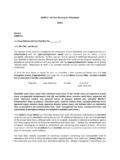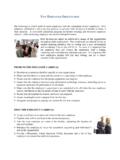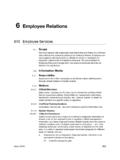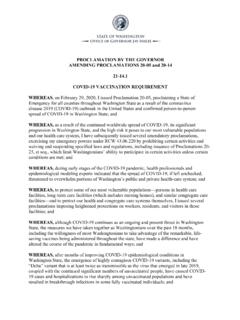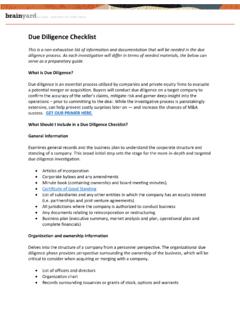Transcription of Employee Discipline - WV Division of Personnel
1 SUPERVISOR S GUIDE TO PROGRESSIVE CORRECTIVE and DISCIPLINARY ACTION Employee Relations Section January 2014 West Virginia Division of Personnel January 2014 Supervisor s Guide to Progressive Corrective and Disciplinary Action Page i TABLE OF CONTENTS DISCLAIMER .. ii INTRODUCTION .. 1 LIBERTY AND PROPERTY INTERESTS .. 2 GOOD CAUSE .. 2 DUE PROCESS .. 3 PROGRESSIVE CORRECTIVE AND DISCIPLINARY ACTION .. 4 West Virginia Division of Personnel January 2014 Supervisor s Guide to Progressive Corrective and Disciplinary Action Page ii DISCLAIMER This Supervisor s Guide to Progressive Corrective and Disciplinary Action is intended to be used as a reference and procedural guide to corrective/disciplinary actions.
2 The general information it contains should not be construed to supersede any law, rule, or policy. In the case of any inconsistencies, the statutory and regulatory provisions shall prevail. This guide is written with the understanding that the West Virginia Division of Personnel is not engaged in rendering legal services. If legal advice or assistance is required, the services of legal counsel should be sought. Supervisors should also refer to the policies, rules and regulations, as well as consult with the human resources office within his or her respective agency.
3 For technical assistance concerning specific situations, employees and employers may contact the Division of Personnel s Employee Relations Section at (304) 558-3950, extension 57209. West Virginia Division of Personnel January 2014 Supervisor s Guide to Progressive Corrective and Disciplinary Action Page 1 PROGRESSIVE CORRECTIVE AND DISCIPLINARY ACTION I. INTRODUCTION As we know, in order to maintain an efficient and effective work environment, employers are often required to address inappropriate Employee behavior and/or performance through corrective and/or disciplinary action.
4 Corrective action is defined, in this context, as: coaching; verbal warning; and written warning (reprimand). Disciplinary action is defined as: suspension; demotion; and dismissal. We draw the distinction between corrective and disciplinary action in that corrective action consists of employer interventions on the lower end of the continuum, and disciplinary action consists of employer interventions on the upper end of the continuum. In disciplinary action, the Employee s property interest in drawing an uninterrupted salary at a particular level is negatively affected, either by suspension, reduction (demotion), or termination (dismissal).
5 It is important to note, however, that the West Virginia Public Employees Grievance board has considered verbal and written warning disciplinary action when assigning burden of evidence in a grievance proceeding. The West Virginia Supreme Court of Appeals has determined that our State civil service statute ( 29-6-1 et seq.) requires that disciplinary actions be only for cause, and that the Employee be provided due process. West Virginia Code 29-6-10(12) provides, in pertinent part, [f]or discharge or reduction in rank or grade only for cause of employees in the classified service.
6 Discharge or reduction of these employees shall take place only after the person to be di scharged or reduced has been presented with the reasons for such discharge or reduction stated in writing, and has been allowed a reasonable time to reply thereto in writing, or upon request to appear personally and reply to the appointing authority or his or her deputy. The Court has established that [t]he basic purpose of the civil service law is to afford to covered employees security of tenure. Mackin v. Civil Serv.
7 Comm n, 155 139, 181 684, 1971 LEXIS 183 (1971). More specifically, the Court has held that [g]ood cause must exist for the dismissal of an Employee in the classified service. Not only shall good cause be alleged in the dismissal of such Employee but it must be proved in the event of an appeal from the dismissal. Yates v. Civil Serv. Comm n, 154 696, 178 798, 1971 LEXIS 230 (1971). Additionally, ..[A]ll the process that is due is provided by a pretermination opportunity to respond, coupled with post-termination administrative procedures.
8 Swiger v. Civil Serv. Comm r, 179 133, 365 797, 1987 LEXIS 695 (1987). Consequently, familiarity with the concepts of property interest, good cause, and due process are necessary to the administrator of disciplinary action in the classified service (civil service). Employer violations of Employee liberty and/or property interests may create exposure to significant civil liability. II. LIBERTY AND PROPERTY INTERESTS The Due Process Clause, Article III, Section 10 of the West Virginia Constitution, requires procedural safeguards against State action which affects a liberty or property interest.
9 The liberty interest includes West Virginia Division of Personnel January 2014 Supervisor s Guide to Progressive Corrective and Disciplinary Action Page 2 an individual s right to freely move about, live and work at his chosen vocation, without the burden of an unjustified label of infamy. A liberty interest is implicated when the State makes a charge against an individual that might seriously damage his standing and associations in his community or places a stigma or other disability on him that forecloses future employment opportunities.
10 A property interest includes not only the traditional notions of real and personal property, but also extends to those benefits to which an individual may be deemed to have a legitimate claim of entitlement under existing rules or understandings. A State civil service classified Employee has a property interest arising out of the statutory entitlement to continued uninterrupted employment. The extent of due process protection affordable for a property interest requires consideration of three distinct factors: first, the private interests that will be affected by the official action; second, the risk of an erroneous deprivation of a property interest through the procedures used, and the probable value, if any, of additional or substitute procedural safeguards.


